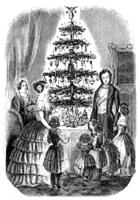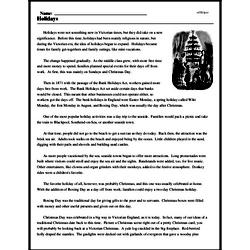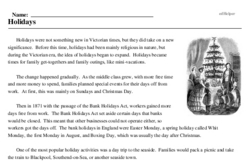Holidays
Holidays were not something new in Victorian times, but they did take on a new significance. Before this time, holidays had been mainly religious in nature, but during the Victorian era, the idea of holidays began to expand. Holidays became times for family get-togethers and family outings, like mini-vacations.
The change happened gradually. As the middle class grew, with more free time and more money to spend, families planned special events for their days off from work. At first, this was mainly on Sundays and Christmas Day.
Then in 1871 with the passage of the Bank Holidays Act, workers gained more days free from work. The Bank Holidays Act set aside certain days that banks would be closed. This meant that other businesses could not operate either, so workers got the days off. The bank holidays in England were Easter Monday, a spring holiday called Whit Monday, the first Monday in August, and Boxing Day, which was usually the day after Christmas.
One of the most popular holiday activities was a day trip to the seaside. Families would pack a picnic and take the train to Blackpool, Southend-on-Sea, or another seaside town.




